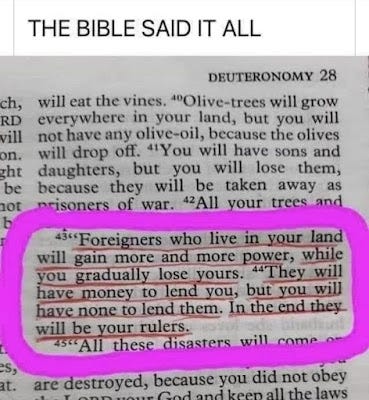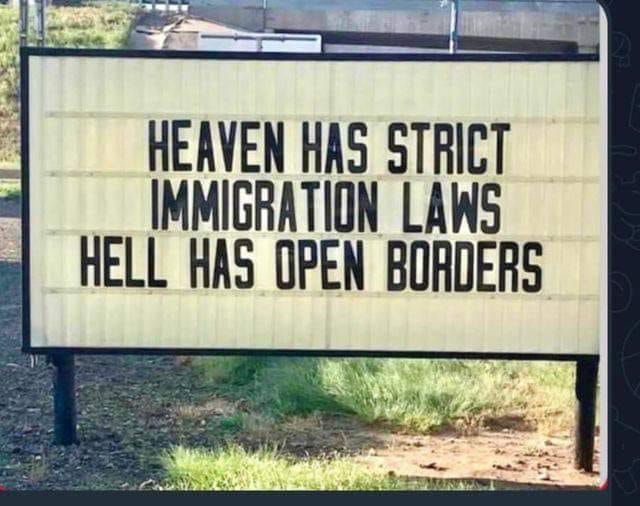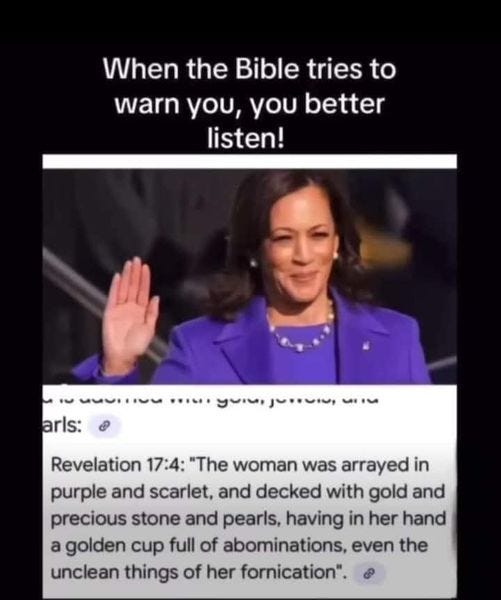(This article originally appeared on my blog in September 2023. It would normally show up in Monday Memories, but since I’ve seen some additional social media traffic related to it, I figured I would republish as a main post with some expansion.)
A Year Ago
I recently saw the following image shared by two Facebook friends on the same day (both of whom I knew growing up in church).
I've written before about the importance of making sure we look at the actual context of a verse of Scripture before trying to take it and apply it to our own situations.
Notice how this image selects and highlights just one isolated verse from an entire chapter of the book of Deuteronomy, where Moses is reminding the new generation of Israelites who will occupy the Promised Land concerning what God requires of them as people who bear his name. If we go back to the beginning of Deuteronomy 28, we see that Moses is laying out the blessings they will experience if they keep the terms of the covenant (vv. 1-14), and the judgments or curses that will befall them if they break the covenant (vv. 15-68).
The first mistake of the meme creator (and repeated by those passing it around on social media) is ripping this verse from the broader context of the entire discourse of Moses to the people of Israel. Knowing the political leanings of the individuals among my friends who posted this meme (many of which I share, though I reject the extremism that has taken over the major party that more closely aligns with my own thinking), I'm fairly certain that they are using this verse to complain about the current immigration situation in the United States. But if we look back at verse 15 of this chapter in the final book of Moses, we see that this isn't a prediction of certain demographic trends in 21st-century America, but rather one of many negative consequences Israel can expect to suffer for being unfaithful to the covenant with YHWH.
The first interpretive mistake points us to the seconds one: the blessings and curses of Deuteronomy 28 are related to God's covenant with His chosen people Israel, not with any modern geopolitical nation-state. The closest analog in our day to the people of Israel—those who bore YHWH's name under the first covenant—is not any country with physical borders, but the church, those who bear the name of Christ. Jesus does promise blessings to those who are faithful to His new covenant, but those promises apply to Christians, individually and collectively, not to political nation-states.
As Professor John Walton says, "The Bible was written for us, but it was not written to us." Deuteronomy 28—and the rest of the Mosaic law—is useful to present-day believers for understanding God's character and what He expects from those who claim to be His, but no part of it should ever be ripped from its literary, historical, and cultural context to try to score points in contemporary political debates.
As political theologian Kaitlyn Schiess says in her book The Ballot and the Bible: How Scripture Has Been Used and Abused in American Politics, and Where We Go from Here:
Before we rush into pulling passages from Scripture and applying them to our own political context, we need to have a hermeneutic that can prevent us from misapplication and misunderstanding. (pp. 9-10)
I encourage everyone to watch this video where Kaitlyn discusses ways the Bible has been misused and abused in politics
To those who would like to use Deut. 28:43 to make commentary on American politics, I have just one question: how are you doing personally with all the covenant requirements to which this chapter refers in verses 1, 15, and 58?
Here We Go Again
This brings me to the most recent meme I have seen in circulation that tries to link the Bible to U.S. immigration policy:
While listening to an episode of The Two Cities podcast that touched on the topic, I learned that former director of the Presidential Personnel Office under Trump, John McEntee, said something similar in a TikTok video, saying, “You know who else has a strict immigration policy? Heaven.” Now, I don’t know if McEntee’s TikTok video came first, and gave rise to the meme above and others like it, or if he was repeating something he had already seen or heard.
In any case, it is an abuse of Scripture and the Christian faith to try to link the labyrinthine immigration regulations of the United States to matters of eternal salvation. Anyone who does this clearly isn’t familiar with immigration law, and maybe doesn’t even understand the gospel.
To get permanent resident alien status in the U.S., one has to meet one or more of several requirements: family member of a U.S. citizen or current permanent resident, show one will be able to support oneself and not become a public charge (need welfare programs), pass a health screening for communicable diseases, etc. Then, to become a citizen, one has to go through another application and approval process after holding residency for a minimum of five years (two years if residency was obtained through marriage to a U.S. citizen), which includes a written test on the history and government of the United States and a test of the ability to communicate in basic English. I know quite a bit about this whole process, because I went through it with my wife, who is originally from Mexico.
What does it take to become a citizen of the Kingdom of Heaven? Admitting one needs Jesus to save you from your sins, repenting, and putting your faith in (pledging your allegiance to) King Jesus as your Lord and Savior. No waiting periods, no proving you’re worthy of being let in. A thousand times easier than the U.S. immigration code (which is long overdue for reform, but that’s a conversation for another day).
This week’s episode of the Holy Post podcast used immigration as an example of what is known as “thermostatic public opinion.” I have the video cued up to that part of the conversation:
Retired pastor Pat Kahnke takes on a lot of the current political rhetoric surrounding immigration in this video.
For further reading on the subject of immigration from a biblical point of view (and not simply a political position that calls itself “Christian”), chapter six of Darrell L. Bock’s How Would Jesus Vote? is excellent, as is Daniel Carroll’s The Bible and Borders and Christians at the Border.
Babylon?
As I was developing the expansion of this article earlier this week, my Facebook friend George Burnash II posted the following commentary with the image below, which he had seen circulating among his contacts:
I've seen this a couple of times today. Regardless of your political views, PLEASE DO NOT DO THIS! This is ripping Scripture out of context and trying to make it apply to something that it has nothing to do with. Just because she wore purple doesn't make her the one referred to here any more than you or your spouse fit it.
Purple has a specific reference and symbolism here, as well as a specific situation it's referring to. And the US political system is NOT it.
This is just another example of people looking in the Bible for a passage to support what they already think or believe, and shaping the Bible to those preconceived ideas, rather than reading the Bible with open eyes and an open heart and allowing the text of inspired Scripture to mold one’s heart and mind to the ways of God. (There are actually legitimate arguments that Revelation here is not speaking about an individual, but about political and economic systems that burden and oppress others for the sake of their own aggrandizement. And there’s a strong case to be made that in many ways, the American empire behaves in these beastly ways.)
Just Stop It!
The bottom line? Let’s take the Bible for what it actually is—God’s revelation to humanity of himself and His plan of salvation—and stop trying to mine it for quotes that put God’s stamp of approval on our pre-existing thoughts and propensities.






